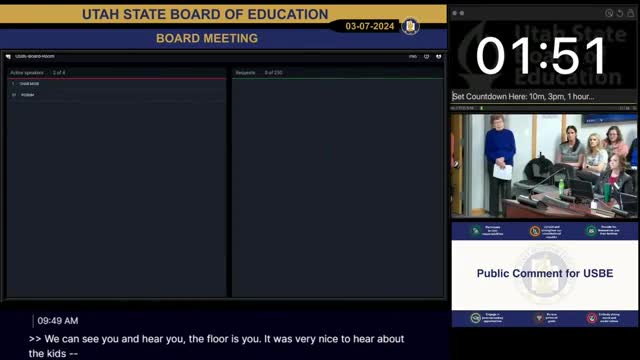Board member faces backlash over controversial comments on education
March 13, 2024 | Utah State Board of Education, Utah Education, State Agencies, Organizations, Utah Executive Branch, Utah

This article was created by AI summarizing key points discussed. AI makes mistakes, so for full details and context, please refer to the video of the full meeting. Please report any errors so we can fix them. Report an error »

During a recent meeting of the Utah State School Board, public comments sparked a heated discussion surrounding board member Natalie Klein and her stance against what some perceive as a liberal agenda infiltrating educational policies. A speaker, addressing the board, expressed strong support for Klein, labeling her a defender of \"truth, freedom, family, and liberty.\"
The speaker criticized the board for what they described as a public shaming of Klein, attributing the controversy to a single Facebook post. They argued that Klein has highlighted the influence of the United Nations' agenda, which they characterized as containing \"communist ideas and programs.\" The speaker specifically condemned concepts such as diversity, equity, and inclusion, claiming these principles are rooted in a political ideology that seeks to transform educational institutions.
Referencing historical figures and events, the speaker invoked Alexander Solzhenitsyn and the atrocities of communist regimes, warning against the dangers of adopting policies they believe align with such ideologies. They emphasized the need for the board to prioritize high-quality education and resist what they see as a progressive agenda.
The meeting underscored the ongoing tensions within the board regarding educational content and the influence of broader political ideologies on school policies. As discussions continue, the implications of these debates may shape the future direction of education in Utah.
The speaker criticized the board for what they described as a public shaming of Klein, attributing the controversy to a single Facebook post. They argued that Klein has highlighted the influence of the United Nations' agenda, which they characterized as containing \"communist ideas and programs.\" The speaker specifically condemned concepts such as diversity, equity, and inclusion, claiming these principles are rooted in a political ideology that seeks to transform educational institutions.
Referencing historical figures and events, the speaker invoked Alexander Solzhenitsyn and the atrocities of communist regimes, warning against the dangers of adopting policies they believe align with such ideologies. They emphasized the need for the board to prioritize high-quality education and resist what they see as a progressive agenda.
The meeting underscored the ongoing tensions within the board regarding educational content and the influence of broader political ideologies on school policies. As discussions continue, the implications of these debates may shape the future direction of education in Utah.
View full meeting
This article is based on a recent meeting—watch the full video and explore the complete transcript for deeper insights into the discussion.
View full meeting

